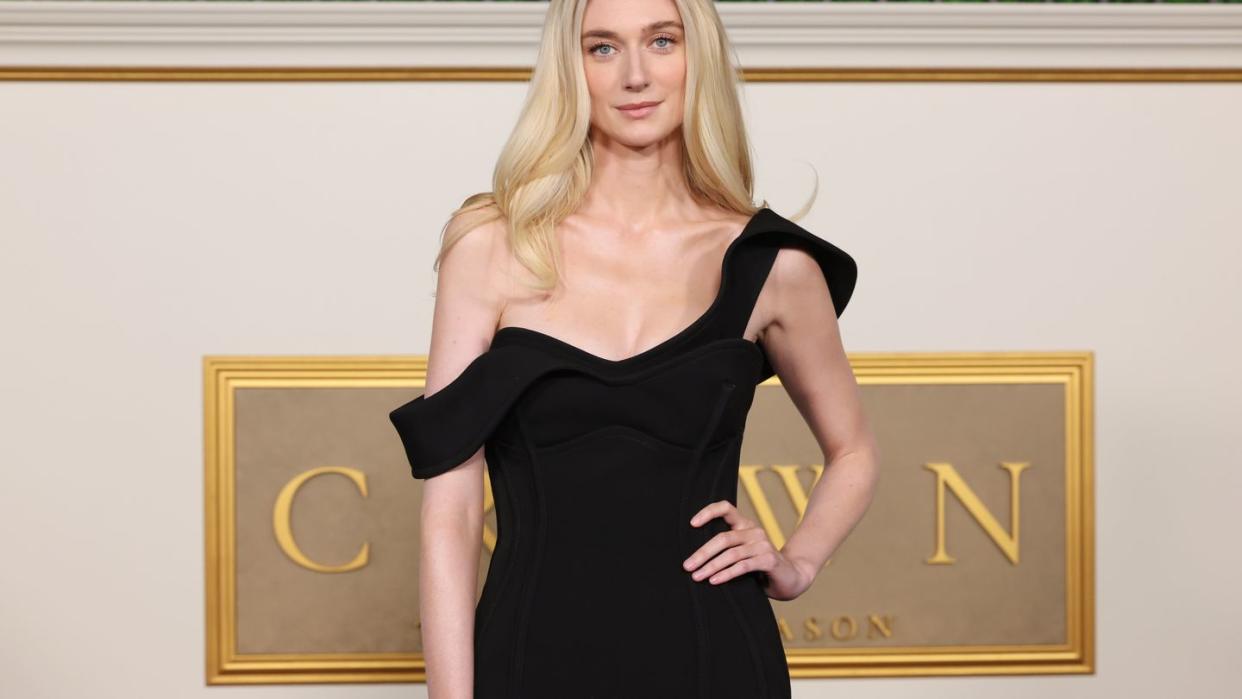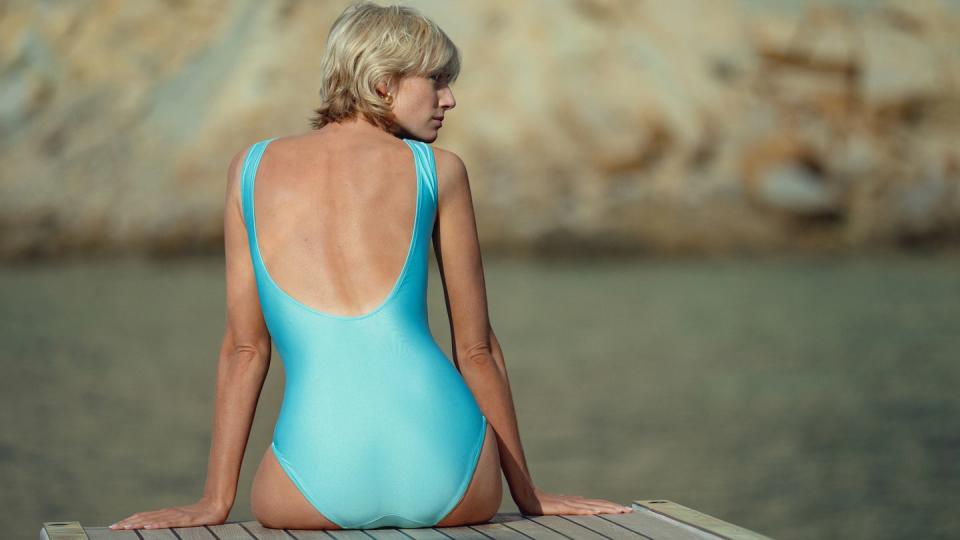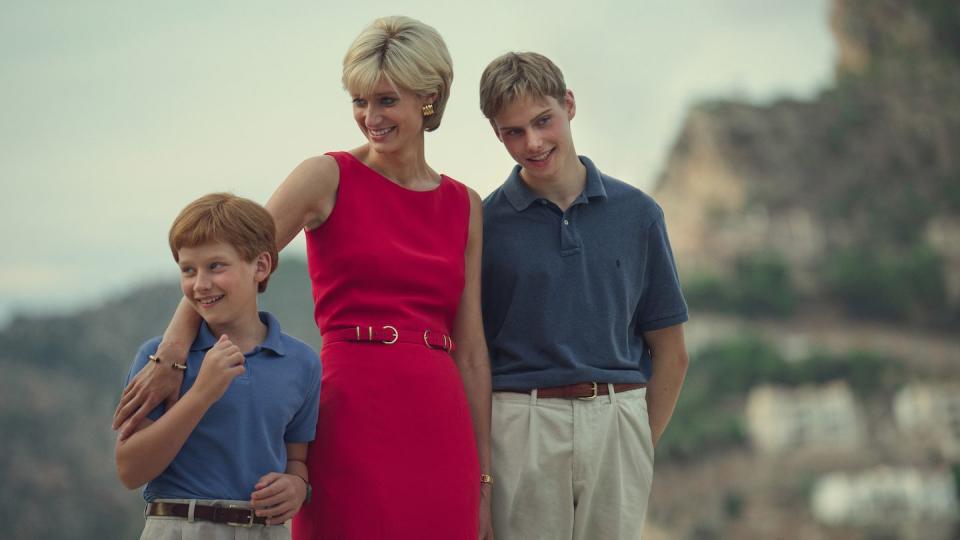What Elizabeth Debicki Learned From Playing Princess Diana

- Oops!Something went wrong.Please try again later.
- Oops!Something went wrong.Please try again later.
- Oops!Something went wrong.Please try again later.
Elizabeth Debicki was under no illusion about the responsibility that came with re-creating Princess Diana’s final days. The impending death of the beloved royal looms large over the first three episodes of The Crown’s sixth and final season, which chronicle the weeks leading up to her fatal 1997 car crash in Paris.
Recent years have seen numerous portrayals of the princess’s life: Kristen Stewart reimagines a tense Christmas holiday toward the end of Diana’s marriage to Prince Charles in Pablo Larraín’s Spencer, while more recent documentaries, such as Ed Perkins’s The Princess, attempt to reexamine her life and legacy as a cultural icon. But The Crown stands out as the highest-profile project to explore Diana’s indelible impact on the British monarchy—and the interpretation that, truthful or not, will stick out perhaps as the most enduring depiction of her final days with boyfriend Dodi Fayed.
“I think Princess Diana, in the way that I’ve tried to play her, is someone who tries to make people at ease, but it’s not often that she’s going to come across someone of a certain status in life who is able to facilitate a kind of lifestyle and understand [her] needs,” Debicki tells Harper’s Bazaar. The Australian actor received an Emmy nomination for her portrayal of “the people’s princess” in the fifth season.
“My Diana is someone who’s not been listened to very well or given a lot of space to be seen in a certain light. The way that Khalid [Abdalla] played Dodi informed a lot of what I found out in the relationship—that he’s very gentle, he’s very loving, he listens in an incredible way,” Debicki continues. “[There’s] this sense of, ‘Oh, isn’t this an unexpectedly easy relationship that we’ve fallen into?’ And then there’s this trajectory in the story where the media coverage of the relationship taints it, spins it in a certain way, and all of that lightness and air in the relationship becomes much more pressurized.”
On a recent call from New York City, Debicki reflected on the harrowing and emotional experience of reimagining the end of Princess Diana’s life, and the lessons she will take from playing one of the most famous women in the world.
You’ve spoken extensively about your desire to imbue your interpretation of Diana in her final days with a real vivacity, to make her feel as alive as possible. What specifically did you want to capture about the final weeks of her life?
I think one of the most important things—and it has been the case for me the whole way through—is the relationships she has with her children. All I ever had as an actor was the outline, the silhouette, the public-facing narrative, whether it’s an interview, a speech, or something that’s written down. I always think of them as silhouettes in a way, and what I’ve sensed in the outline was that there was a real joy—albeit difficult at times because of the press coverage. We know historically that was really, really difficult for her children, and understandably so. Anyone who wants to go away with their kids and have a nice family vacation does not want to be pursued by the paparazzi. That’s just basic common sense. One should have a right to privacy, and that was taken away from them even on that holiday, so it created a kind of pressure.
But at the same time, there are lots of snaps that you see where [she] just looks full of joy and like a mother really attempting to make sure her teenage boys have a really good time on holidays, and that’s really what I leaned into trying to put onscreen. As the character, I enjoy [the kids] so much, and the actors who play them are just absolutely glorious kids. So there was just a real sense of “Let’s lean into creating a portrait where we’re just happier together.” Certainly, when I was playing the character, I always felt that in a very, very strong way. I just wanted the kids around me, felt like I was more her and more whole somehow when they were there, and the best version of that is us on a silly boat in the middle of the Mediterranean.
The fashion in the final season may not be as striking as your first season on The Crown, which re-created iconic looks such as the “revenge dress,” but you had a chance to don some distinctive, Diana-inspired swimsuits from the ’90s this time around.
I did not adore the swimsuits. I find that ’90s cut particularly unforgiving. My personal stance is that Diana rocked them—they really, really suited her—and I always understood it was a costume and something I had to wear. There was a kind of joy in it, though, because I think when you wear a swimsuit and you’re on a boat in the sun or you’re splashing around, it does immediately evoke the feeling of being on a vacation. So it was unlike so many more buttoned-up things [that I’ve worn on the show]. When you’re shooting in rainy England, I feel like putting a swimsuit on just makes you feel physically free, doesn’t it? So that was enjoyable for me, and I feel like she always had such confidence and a kind of strength in her body. She was really an athlete at that point, she was so dedicated to training, and she looked incredible in the swimsuit. And I tried my best. [Laughs.]

Having gone to great lengths to re-create the iconic photograph of Princess Diana sitting on the edge of a diving board in a blue swimsuit, what do you think was going through her head at that moment?
I was just as curious and have as many questions about the blue swimsuit. One of the things about doing The Crown is, you do not have the answers. You’re not an authority; you are putting the pieces together like other people are. I have access to a lot of archival stuff, but that doesn’t mean I have the answers. So, for instance, in that diving board photo, I too wondered before making choices as an actor: What was going on? Did she know she was being photographed, and was she doing it on purpose? There seems to be a real melancholy to those photos, but it’s also a very independent moment in her life.
Having donned the bathing suit and walked out to that diving board and sat there for a while, I let myself go through various imaginings of what’s going on. And for the character, there is a real kind of loneliness and perhaps an awareness that you’re being photographed, but a real sense of just needing a moment to reflect—albeit we don’t know if it was intentional or unintentional, and we’ll never know …
You relished the opportunity to play the happier and lighter moments between Diana and her children, but there is still this really heavy undercurrent that looms over the first three episodes, because we all know what is going to happen. Was there a particularly difficult or painful scene for you to shoot in this final arc?
Although my actor brain understands the story and how each piece of the puzzle needs to be told in order to create this whole arc, I’m also just very, very present in each moment and, therefore, the most difficult things to experience emotionally, as the character, were the scenes around trying to get the boys on the phone. It should be such a simple thing for a mom to be able to call her kids, and yet [she faces] this obstacle—this beast of the media, of the paparazzi, that she just cannot avoid. It just seems to grow in pressure, and there’s this very aggressive energy around her. I just wanted to be able to get out of it, escape it, just make my way through it. When you shoot television or film, it might be 10 seconds of screen time, but that might equate to three, four days of shooting, so it’s a very unusual headspace to be in.
I’ve been trying to describe it, and I’m not conscious of this so much as an actor when I’m doing it, but it’s sort of like the water line is coming up a lot through that [third] episode in particular. As the character, I was just trying to keep my head above it because of my need to get there, call the kids, connect to them. At that moment, I just really, really missed them. And in fact, it took so long to get to the scene where I finally talked to them on the phone. I hadn’t actually seen them for a few weeks, and then it was just a delight. We shot it in this old set somewhere in central London, and they were the little voices on the end of the phone, and it was actually a relief to do that. I was so happy to actually get there. [Laughs.]
How would you describe the visceral experience of being chased by paparazzi? Did you find it difficult at all to draw that line between fiction and reality when you were acting in those scenes?
It plays like a stunt. I’ve never done a big superhero [film] where I’m flying around for weeks in a harness, so I’ve done limited stunt work as an actor, [but] what I’ve always experienced is that there’s this choreography. People involved are very, very good at what they do. They’re very safe. You trust them entirely. Yet as soon as you start to roll the cameras, your body doesn’t always know the difference, right? That’s the very strange thing about acting. It’s sort of like we are allowing the chemical reaction [to happen], whether it’s stress hormones or the fight-or-flight response.
The other thing that really struck me at the time of shooting those scenes, especially when [the paparazzi] are coming right up to the window and they’re yelling and taking photographs, even in and out of the car sequences, I remember thinking, What do they actually want? If this was real life, what are you actually getting? It was so frenzied and mad by that point. It was just a sense of people wanting a piece of something—just this mob mentality about it that just lost any thread of sense by that point. And that was another piece of it that became very clear to me. When you are inside the stunt version of it, you just think, This is absolutely mad. Nobody should ever be pursued like this. There should be some law against people being able to do this to somebody. And it doesn’t make any sense why you are snapping through a tinted window.

There’s been a fair amount of social media chatter about the way The Crown depicts the aftermath of Diana’s death. The so-called “ghost” scenes, to me, are really just a device to show that Diana continues to live vividly in the imaginations of those who knew and loved her. What was your interpretation of Diana’s reappearance in the fourth episode? Did Peter Morgan ever explain that creative decision to you?
I don’t think he ever explained it to me. On a conceptual level, just as a regular human being who has experienced grief in my life, I understood that when one loses someone one loves, one often begins to have a conversation with that person in the aftermath. I think that’s quite a universal experience of grief. I thought, Okay, I understand conceptually what this is, and it’s the writer’s choice of device, so it’s my job as an actor to embody that as best I can.
When we came to set, both [Dominic West, who plays Prince Charles] and I were curious about how to play it. Neither of us had made decisions. And in fact, I don’t think we rehearsed. I think we just rolled the cameras and what comes out is just a conversation in a way. We didn’t try to overcomplicate anything, as actors. We just allowed the scene to be what it is. I’m sure there’s a lot of chat, and I’m sure there are a lot of opinions, but my way of understanding the device was that I understood that need to suddenly speak to somebody [after they’ve just died].
What are some of the biggest lessons you’ve learned from playing Diana? Have you found it difficult at all to let her go, given all of the time you’ve spent trying to embody her and imagining what it was like to be in her shoes?
I think the idea of letting go of a character sometimes feels very appropriate. If it’s a character that you’ve embodied and it feels like, Okay, I’m done with that, you’re really ready to wash it off. But this is very different for me. I’ve learned a lot from studying her life, and I find the years that I played the character based on her—those years in the ’90s—they were completely tumultuous. They were also years of watching a human being grow into themselves and emerge kind of luminous through immense difficulties that were played out in the public eye, and also a person who comes to trust their own voice, their own personal power, and what they’re capable of doing.
It seems to me, in my interpretation, that she was really someone who in their vulnerability found strength, and I find that very inspiring. She learned to move the needle on really profound issues that were just not being touched by anybody else because they were either highly stigmatized, or there was a lot of talk of political repercussions, should somebody take up the cause. It seems to me that she was somebody who was capable of giving an enormous amount of love and just lived for those moments of being able to connect with people and understood that, what else is there, really, in life, other than giving that to people? It takes immense generosity, immense strength. I never sensed an agenda there. It just seems uncannily natural.
I think just looking at that and learning from that, you think, Well, why not? Life is short, and all we have are the people around us, and we should endeavor to be as kind and generous to everybody—to our neighbors, to people who are suffering, people who have less than us. I also think she put love at the center of her life for her children; and I think she believed that pursuing the love she felt she was worthy of receiving was also a worthy pursuit to put at the center of her life, and I’ve learned from that too.
This interview has been edited and condensed for length and clarity.
You Might Also Like

